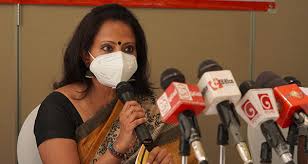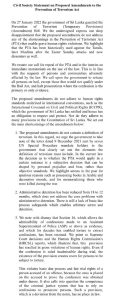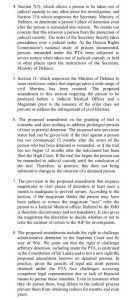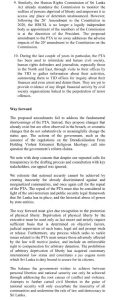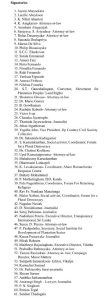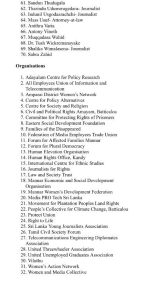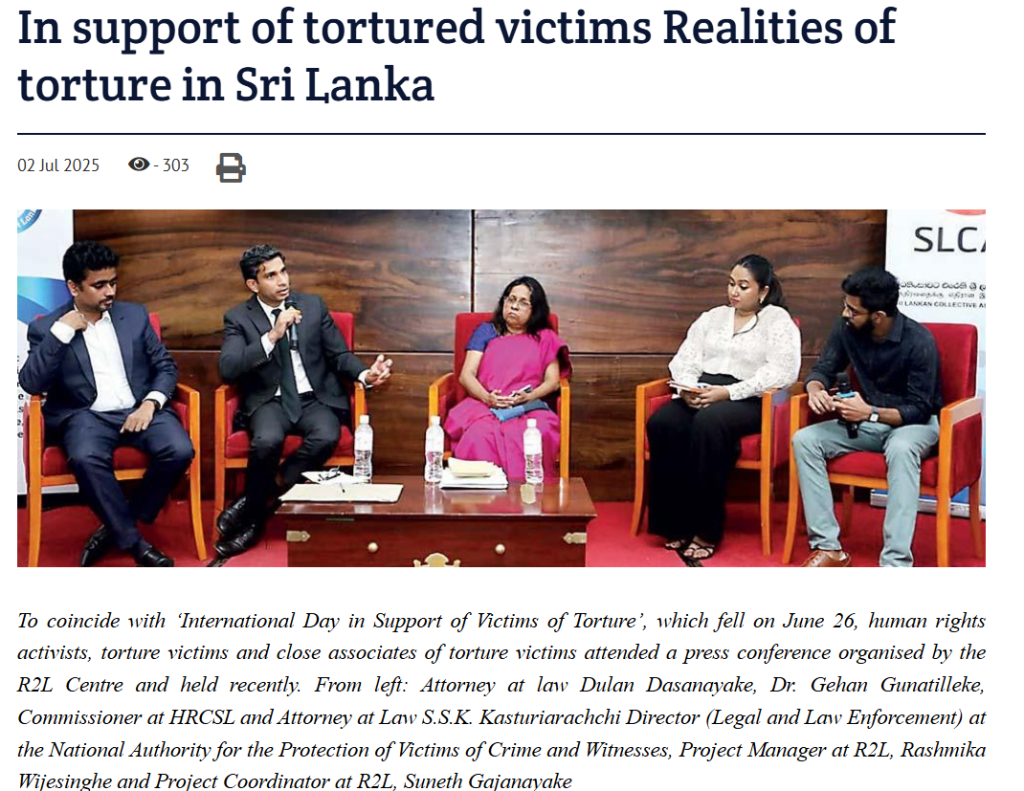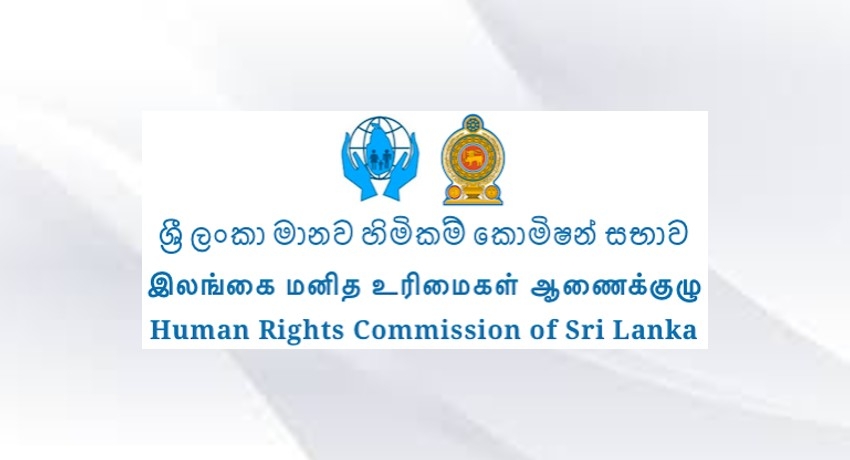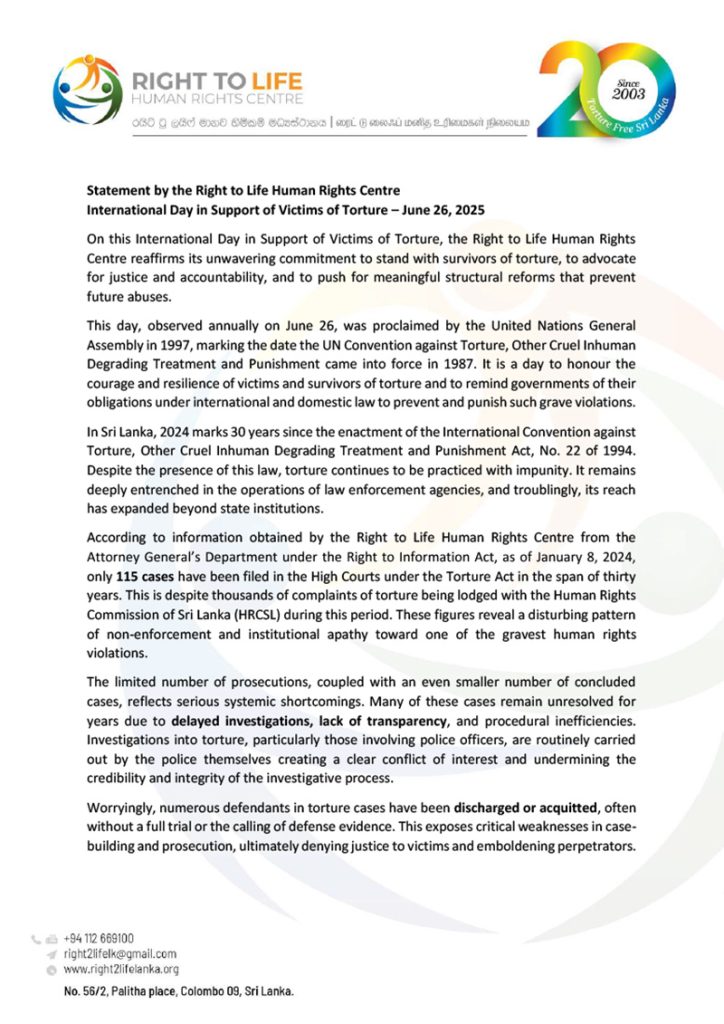160 civil society activists and 47 organizations issued a statement of solidarity condemning the Ministry of Foreign Affairs’ response to former commissioner of the Human Rights Commission Ms. Ambika Satkunanthan.
On 27 January 2022 the government of Sri Lanka gazetted the Prevention of Terrorism (Temporary Provisions) (Amendment) Bill. We the undersigned express our deep disappointment that the proposed amendments do not address any of the shortcomings in the Prevention of Terrorism Act (PTA) that enable grave human rights violations. We highlight that the PTA has been historically used against the Tamils, later Muslims after the Easter Sunday attacks and now dissenters as well.
We restate our call for repeal of the PTA and in the interim an immediate moratorium on the use of the law. This is in line with the requests of persons and communities adversely affected by the law. We call upon the government to release all persons on bail, except those that would not qualify under the Bail Act, and halt prosecutions where the confession is the primary or only evidence.
The proposed amendments do not adhere to human rights standards enshrined in international conventions, such as the International Covenant on Civil and Political Rights (ICCPR), which the government of Sri Lanka has ratified and hence has an obligation to respect and protect. Nor do they adhere to many provisions in the Constitution of Sri Lanka. We set out the main shortcomings of the amendments below:
- The proposed amendments do not contain a definition of terrorism. In this regard, we urge the government to take note of the letter dated 9 December 2021 sent by seven UN Special Procedure mandate holders to the government that clearly set out the elements the definition of terrorism must include. In the current law the decision as to whether the PTA would apply in a certain instance is a subjective decision that can be shaped by personal prejudice and bias, rather than objective standards. We highlight arrests in the past for spurious reasons such as possessing books in Arabic and decorative swords, and for memorializing those who were killed during the war.
- Administrative detention has been reduced from 18 to 12 months, which does not address the core problems with administrative detention. There is still a lack of basic due process safeguards which enables arbitrary arrest and detention.
- We note with dismay that Section 16, which allows the admissibility of confessions made to an Assistant Superintendent of Police (ASP) or above as evidence, and which for decades has enabled torture to extract confessions, has been retained. We point to Supreme Court decisions and the Human Rights Commission’s (HRCSL) reports, which illustrate that, this provision has resulted in gross violations of human rights. Even if the confession is ruled inadmissible during trial, the existence of the provision creates room for persons to be subject to torture.
This violates basic due process and fair trial rights of a person accused of an offence, because the onus is placed on the accused to prove the confession was obtained under duress. It also calls into question the competence of the criminal justice system that has to rely on confessions to prosecute persons. Such a provision, which is a deviation from the norm, has no place in law.
- Section 7(3), which allows a person to be taken out of judicial custody to any other place for investigation, and Section 15A which empowers the Secretary, Ministry of Defence, to determine a person’s place of detention even after the person is remanded also remain. We restate our concern that this removes a person from the protection of judicial custody. The order of the Secretary thereby takes precedence over a judicial order. As the Human Rights Commission’s national study of prisons documented, persons remanded under the PTA were subjected to severe torture when taken out of judicial custody or held in other places upon the instructions of the Secretary, Ministry of Defence.
- Section 11, which empowers the Minister of Defence to issue restriction orders that impinge upon a wide range of civil liberties, has been retained. The proposed amendment to this section requiring the person to be produced before a Judicial Medical Officer and a Magistrate prior to the issuance of the order does not prevent or address the infringement of civil liberties.
- The proposed amendment on the granting of bail is cosmetic and does nothing to address prolonged periods of time in pretrial detention. The proposed new provision states bail can be given only if the trial against a person has not commenced 12 months after the arrest of the person who has been detained or remanded, or if the trial has not begun 12 months after the indictment has been filed the High Court. If the trial has begun the person can be remanded in judicial custody until the conclusion of the trial. Therefore, in practice, this does not bring substantive change in the situation of a detained person.
- The provision in the proposed amendment that requires magistrates to visit places of detention at least once a month is inadequate to prevent torture. According to the section, if the magistrate thinks the person may have been subject to torture the magistrate “may” refer the person to a Judicial Medical officer. Referral to the JMO is therefore discretionary and not mandatory. It also gives the magistrate the discretion to decide whether or not to refer the incident of torture to the IGP for investigation.
- The proposed amendments include the right to challenge administrative detention in the Supreme Court and by way of Writ. We point out that the right to challenge arbitrary detention, including under the PTA, is enshrined in the Constitution of Sri Lanka and is not a new right the proposed amendment bestows on detained persons. In practice, given the paucity of legal aid, most persons detained under the PTA face challenges accessing competent legal representation due to lack of financial means to pursue these remedies. Even in instances when they do pursue them, long delays in the judicial process prevent them from obtaining redress for months and even years.
- Similarly, the Human Rights Commission of Sri Lanka Act already mandates the Commission to monitor the welfare of persons deprived of liberty and empowers it to access any place of detention unannounced. However, following the 20th Amendment to the Constitution in 2020, the HRCSL is no longer a legally independent body as appointment of the members of the Commission is at the discretion of the President. The proposed amendment to the PTA in no away addresses the adverse impacts of the 20th amendment to the Constitution on the Commission.
- During the last couple of years in particular, the PTA has been used to intimidate and harass civil society, human rights defenders and journalists, especially those in the North and East, through visits to their offices by the TID to gather information about their activities, summoning them to TID offices for inquiry about their finances and even arrest and detain them. They are yet to provide evidence of any illegal financial activity by civil society organisations linked to the perpetration of terror offences.
Way forward
The proposed amendments fail to address the fundamental shortcomings of the PTA. Instead, they propose changes that already exist but are often observed in the breach, or cosmetic changes that do not substantively or meaningfully change the status quo. The actions of the government, such as the issuance of the regulations on the Deradicalisation From Holding Violent Extremist Religious Ideology, call into question the government’s reform claims.
We note with deep concern that despite our repeated calls for transparency in the drafting process and consultation with key stakeholders, our appeal was ignored.
We reiterate that national security cannot be achieved by creating insecurity for already discriminated against and marginalized communities, and once again call for the repeal of the PTA. The repeal of the PTA must also be considered in light of the anti-terrorism and public security legal framework that Sri Lanka has in place, and the historical abuse of power by state entities.
The way forward must give due recognition to the protection of physical liberty. Deprivation of physical liberty by the executive must be used only as last resort and strictly require sufficient basis that is determined on objective factors, judicial supervision of such basis, legal aid and prompt trials or release. Furthermore, any process which seeks to tackle issues related to the PTA must ensure those adversely affected by the law will receive justice, and include an enforceable right to compensation for arbitrary detention. The prohibition of arbitrary deprivation of liberty has acquired customary international law status and constitutes a jus cogens norm which Sri Lanka is duty bound to secure for its citizens.
The balance the government wishes to achieve between personal liberties and national security can only be achieved through addressing the root causes of conflict and violence. Attempts to further curtail civil liberties in the guise of national security will only exacerbate the insecurity of all communities and undermine the rule of law and democracy in Sri Lanka.

